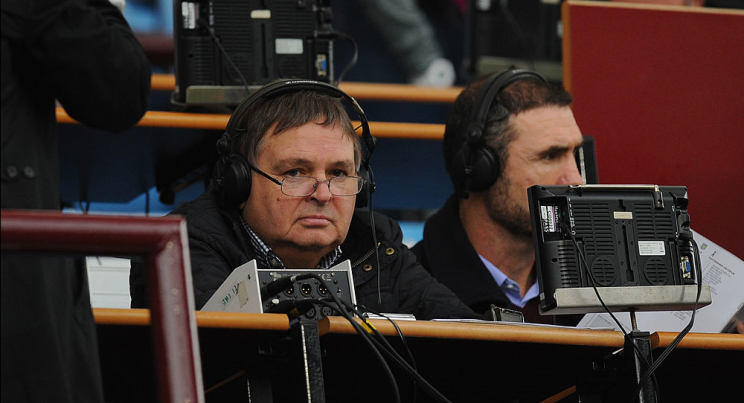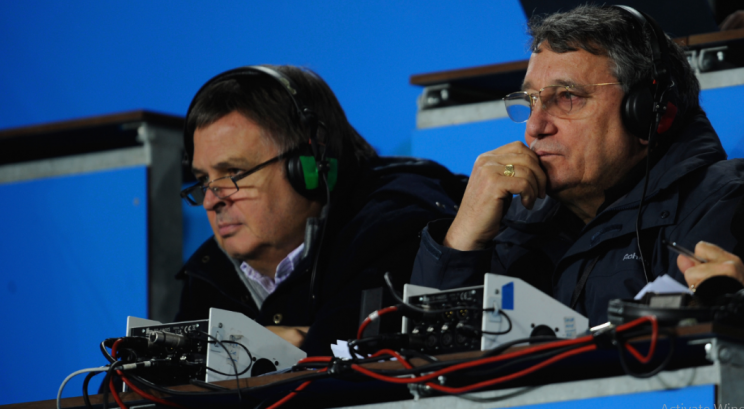Voices of Sport: Alan Green - The opinionated BBC commentator who has described some of sport's greatest moments
In our weekly series, Yahoo Sport’s Nick Metcalfe features a famous voice of sport. On one of the most eagerly awaited weekends of the football season, the third round of the FA Cup, the BBC commentator Alan Green is the latest to go under the spotlight.

Alan Green has been one of the most familiar voices on radio for decades, and has been behind the microphone for some of the most memorable moments in sporting history.
A constant voice throughout the football season, he has commentated on multiple World Cup finals, FA Cup finals and a number of thrilling Premier League title races.
Green also regularly worked in the past at the Open Championship and Ryder Cup for BBC Radio, as well as becoming the established voice of rowing at the Olympic Games.
Like many broadcasters in this series, Belfast born Green first worked in local newspapers. He moved to the BBC in 1975, with his main ambition to be a television news producer. He presented current affairs programmes on radio and TV in his native Northern Ireland, before joining BBC Radio’s sports department in Manchester.
His first World Cup for the corporation was the 1982 tournament in Spain and he quickly became established as a major radio voice. The first time I properly remember him was during the 1983/84 season and two Manchester United matches against Barcelona in the European Cup Winners’ Cup, first a 2-0 defeat in the Nou Camp and then a famous 3-0 victory at Old Trafford.
His first FA Cup final was in 1986, the all-Merseyside clash between Liverpool and Everton. This was during an era of some masterful radio commentators at the BBC, who have all featured earlier in this series.
There was the BBC’s authoritative football correspondent Bryon Butler, the peerless Peter Jones and a young Mike Ingham. But Green established himself as a regular voice, even among all that star quality.
One of the saddest moments as a commentator for Green came in the spring of 1989, when he was at Hillsborough for the ill-fated FA Cup semi-final between Liverpool and Nottingham Forest. The bitter memories of that tragic day, which resulted in 96 Liverpool fans losing their lives, has always stayed with Green. He has been outspoken in recent times, complaining about justice being denied for so long to those supporters who died and their families.
Green and Ingham took over as the No.1 commentary pair. Butler was in the autumn of his career, handing over the role of correspondent to Ingham in 1991. And Jones sadly died after collapsing while commentating on the Boat Race in 1990.
The first World Cup final for Green and Ingham as a duo was in 1990, with West Germany beating Argentina in Rome. They actually worked on seven in tandem, right up to the 2014 showpiece in Rio, another victory for Germany over Argentina.
I would say that it was probably in the 1990s that Green really became well known to a wider audience. For one thing, the 1990 World Cup had sparked a new interest in the game. The Premier League was formed, with its riches and foreign stars. And by the time of Euro 96 in England, it had become clear that football was a national obsession.

With many modern commentators tending to sound quite similar, Green’s Belfast accent always stood out. But it wasn’t just that. There was also the small matter of his increasingly strident opinions. It wasn’t just a case any more of switching on the radio to hear the action being described. Instead, when Green was on duty, we were told in no uncertain terms that the match was rubbish, or the referee wasn’t up to it, or that a big name player had performed poorly.
Green soon became a notorious Marmite figure, loved and loathed in equal measure. By this time, bosses at 5 Live – radio sport had switched from Radio 2 to Radio 5 and then to 5 Live – had switched on to this and Green was given his own sports show to present alongside his commentaries. In more recent times, he also presented the phone-in programme 6O6, which gave him an even wider platform to broadcast his views.
Green tended to attract controversy. He fell out with Alex Ferguson, apparently not speaking to him after 1992, although it’s probably fair to point out that Green referred to the incident rather more often than the Manchester United manager ever did.
Despite all this, one thing that I don’t think can ever be doubted about Green is that when the special moments come, he rises to the challenge brilliantly. There’s no way anybody could have scripted what to say on an astonishing evening at the Nou Camp in May 1999, when Manchester United recovered from 1-0 down in stoppage time to beat Bayern Munich in the European Cup final and clinch a unique treble. Teddy Sheringham equalised to rescue United, before they broke clear again and won another corner. Cue Green…
“Beckham crosses from the left, right-footed. It’s a clear header, and it’s into the net. Solskjaer has won the European Cup for Manchester United. It’s absolutely astonishing. It was Sheringham who headed it on and Solskjaer stabbed the ball with his right foot into the roof of the net. And Manchester United rule Europe. I don’t believe it but it’s happened. They’ve come from 1-0 down in stoppage time to beat Bayern Munich. And the Munich players are on their knees. They don’t know what’s hit them. Manchester’s hit them.”
A year later came another sporting moment for the ages, Steve Redgrave winning a rowing gold for the fifth successive Olympic Games in Sydney. You could argue there was more chance to rehearse his words on this occasion, but either way Green was again magnificent.
“I don’t care what you’re doing, stop it. If you’re not standing, get up on your feet. Applaud Tim Foster and James Cracknell. Cheer for Matthew Pinsent, But take the roof off for the greatest British Olympian of all time, the greatest rower of all time, Steve Redgrave.”
Rowing kept producing wonderful moments at the Games, and they were accompanied by the appropriate words from Green. Matthew Pinsent won gold at a fourth Olympics at the 2004 Athens Games. And at London 2012, Green’s final Olympics, there were many special moments for the hosts, which included a long-awaited gold medal for Katherine Grainger.
There were plenty of Open Championships for Green too, as part of the popular BBC radio golf team. And that great biannual contest between teams from America and Europe, the Ryder Cup. Green’s time covering that event included some special European triumphs, like 2002 at The Belfry when Paul McGinley jumped into the lake to celebrate.

But football was always Green’s staple diet. The game has a soap opera like ability to produce great stories and dramatic moments. And listeners have become very used to Green being there when it matters. In fact, the whole routine has become a highly familiar one.
There has always been damning criticism of referees. And of players who he thinks are pretending to be more injured than they are. And on so many occasions over the years, am obvious disdain for England games, whether it’s flat friendlies at Wembley or poor performances at tournaments around the world.
Some of his phrases have become well known too, like a “goodness gracious” when there’s a dramatic goalmouth incident. Or a simple “it’s into the net” for a goal.
Green has continued to be on duty for more special moments for English clubs in Europe. He was at the 2005 European Cup final in Istanbul, when Liverpool came back to stun AC Milan, but his colleague Ingham was behind the microphone for the decisive penalty. He did however have Chelsea’s winning moment as the Blues beat Bayern Munich in the 2012 final. “Come on Didier” he implored as Chelsea star Drogba stepped forward to score from the spot.
After nearly all his career being in radio, Green has made more forays into television in recent times. He sometimes reports on matches for the BBC’s Final Score programme. And since 2014 he has worked on the famous Saturday night programme, Match of the Day. That has certainly taken some getting used to for viewers.
Even to this day, Green is still the same. Earlier this week I heard him commentating on a disappointing goalless draw between Middlesbrough and Leicester. He told 5 Live listeners: “There must be a temptation for some commentators to fool you and tell you it’s a terrific game. It’s not. It’s awful.”
There’s definitely the sense, even as a listener, that Green is a law unto himself. He usually takes a holiday at the start of the season, only taking up commentating in September. He doesn’t mind vehemently disagreeing with a presenter on air, or even criticising an editorial decision taken during a broadcast. He has already said he won’t work at the 2018 World Cup in Russia.
Whenever an online newspaper carries a piece about Green, you can guarantee plenty of interest and a host of critical comments. But, let’s be honest, many listeners do still love him.
Green will turn 65 this year, older than Ingham was when he retired from commentating in 2014. Perhaps Green will also think of hanging up his microphone soon.
Whenever he does decide to do that, we’ll certainly have plenty of his work to listen back to. He’s been around for so long now, millions of fans won’t remember the game without him. He’s become one of the most well known voices, at a time when football seems to have taken over our lives. And one thing remains the same whatever the year – you can’t ignore him.

